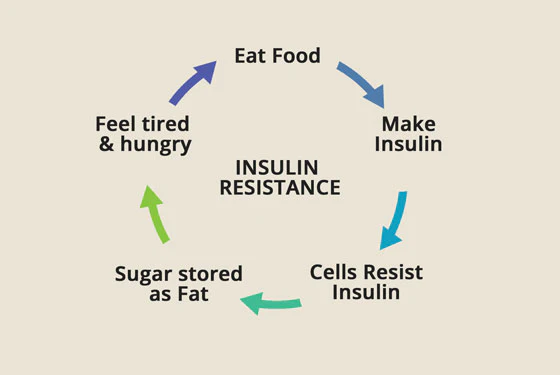
Insulin resistance is a condition where the cells in your body become less responsive to insulin, which is a hormone that helps regulate your blood sugar levels. Think of insulin as a key that unlocks the doors of your cells, allowing glucose (sugar) to enter and be used for energy. In insulin resistance, the locks on the cell doors don’t work properly, so even though there’s plenty of insulin in your bloodstream, the cells don’t respond to it as effectively.
To compensate for this, your body produces even more insulin to try to get the cells to respond. Over time, this can lead to higher levels of insulin in your bloodstream, which can cause various health issues. It can also make it harder for your body to regulate blood sugar levels properly, leading to high blood sugar levels, which is a hallmark of conditions like type 2 diabetes.
Imagine a situation where you have a bunch of keys (insulin) and doors (cells) in your body. Normally, when you put the key in the lock and turn it (insulin binds to the cell receptors), the door opens and glucose (sugar) can enter the cell to be used for energy. But in insulin resistance, the locks on the doors become rusty or jammed (cells become less responsive to insulin), so the key doesn’t work as well. To compensate, your body starts making more keys (produces more insulin), but the doors still don’t open properly. This can lead to high levels of keys (insulin) in your bloodstream, which can cause problems over time such as diabetes, weight gain, increased inflammation, hormonal imbalances, cholesterol, cardiovascular and kidney issues.
Insulin resistance can be caused by many factors including genetics, lifestyle, weight and other health conditions. If you think you may have insulin resistance or are concerned about your blood sugar levels, book an appointment with our Naturopath, Tam.


